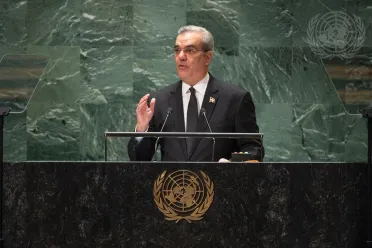Statement
Statement summary
LUIS RODOLFO ABINADER CORONA, President of the Dominican Republic, urged the international community to “take up the issue of Haiti at the highest level of priority with permanent monitoring”. He called on the Security Council to urgently authorize a United Nations-backed security mission with a multinational force to assist the Haitian National Police, as requested by the Government and Secretary-General. He condemned the construction of an illegal diversion canal in Haitian territory by a small group of private individuals to extract water from the Dajabón River, in violation of border treaties between the two countries. Warning that the project risks flooding an industrial park and harming water access for hundreds of farmers, he stressed that his Government has been forced to take forceful measures, including closing the border with Haiti to guarantee security and national interests, as well as protect the country’s rivers, environment and agricultural production. “We do not seek or desire confrontation with the Haitian people”, he added, “but we face uncontrollable actors who foment insecurity.”
He urged all countries considering playing a role to act with determination, because “the problem of Haiti” is in the hands of the international community and is no longer just in Haiti. Answering Haitian requests for assistance by sending a multinational force would keep with the spirit and letter of the United Nations Charter and guarantee peace in accordance with international law. He commended efforts by leaders of the Caribbean Community (CARICOM) to reach a political agreement for the greatest possible legitimacy and acceptance of a multinational force, as well as the implementation of free, fair and transparent elections. “For centuries of often difficult coexistence with the Haitian people”, he continued, “the Dominican Republic has given clear signs of untiring solidarity.” However, there can never be “a Dominican solution to the Haitian problem”, and he reiterated his responsibility to defend the interests of the Dominican people.
As a developing economy with a negative carbon footprint, the Dominican Republic is incentivizing the use of renewable energies, he noted. At the same time, the country still has significant dependence on fossil fuels, and “oil is still important to us.” He called for a financial mechanism to guarantee the stability of crude oil prices for low- and middle-income importing countries. Moreover, he called for the adoption of the Multidimensional Vulnerability Index for all developing countries and implementation of the Loss and Damage Fund to financially support the most vulnerable to adapt to climate change. He warned that the massive proliferation of sargassum seaweed is devouring Caribbean coasts — including along the United States and Mexico — and has serious economic and environmental impacts, especially on tourism that represents up to 75 per cent of some Caribbean economies. While the Dominican Republic has created a multisectoral roundtable on the issue, he called on developed countries to contribute to the solution.
On financing for development, he urged for the creation of a concessional mechanism for middle-income countries to meet the Sustainable Development Goals. Reiterating the Secretary-General’s past statement that the international financial system is broken, he called for in-depth reform of the international financial architecture that can benefit all countries equitably. Furthermore, a pillar of his Government’s commitment to achieve a fairer social contract is to fight against corruption and defend human rights, reflected in the Dominican Republic’s candidacy for the Human Rights Council for 2024 to 2026. Ultimately, his Government is firmly committed to building a model of inclusive human development that is just and sustainable, and the international community must see twenty-first century calamities as opportunities that compel all countries to work together.
Full statement
Read the full statement, in PDF format.
Photo

Previous sessions
Access the statements from previous sessions.
